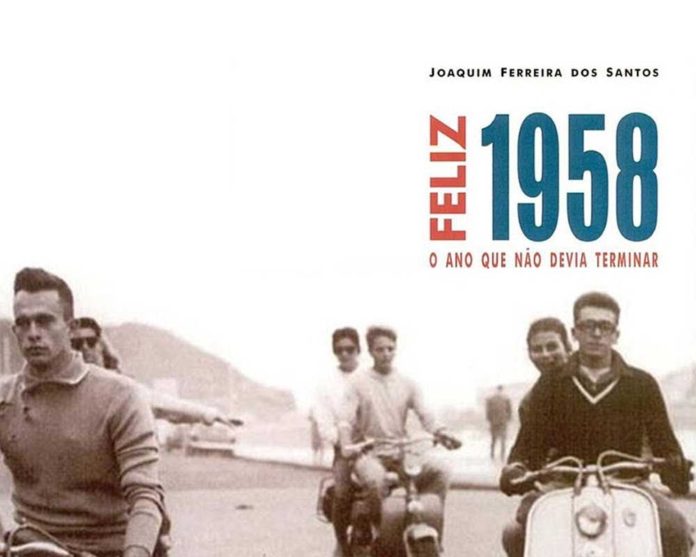By all accounts, it was an amazing year. The country’s young, idealistic President was all about ‘change’ and making a break from the past. His vision was sweeping in its scope; he would transform the nation in front of the world’s watching eyes. Sounds familiar: Obama and the USA? Nope, becasue here’s every important thing that happened in Brazil in 1958.
By 1958, ‘J.K.’ – Juscelino Kubitschek, Brazil’s 24th President – was just beginning the third year of his five-year term and indeed, Brazil was on the rise. His promise of “50 Years Of Progress In Five” resonated with post-war Brazil and a booming economy was on the horizon.
And while the headlines back then suggested that he was on his way to becoming the most popular President in Brazilian history, it was just one of the many amazing stories for Brazil that year.
Fifty years later, I was browsing the book tables at Ipanema’s Toca de Vinicius when I came across a copy of Feliz 1958—O Ano Que Não Devia Terminar (Happy 1958—The Year That Shouldn’t End) by Joaquim Ferreira dos Santos. Santos does a wonderful job at capturing the nuance of those 365 days. Snapshots in time.
That was the year famed architect Oscar Niemeyer was involved with the creation of the country’s new capitol city, Brasília, literally cut out of the Brazilian interior. Brazilian tennis star Maria Ester Bueno won at Wimbledon and Miss Brazil became the first runner up at the Miss Universe competition.
1958 was the year of the hula hoop (called ‘bambolê’ in Brazil). The year that actress Nélia Paula created a national scandal by becoming the first Brazilian woman to wear a bikini in public. Copacabana beach would never be the same.
The year that saw a zoo rhinoceros elected to the São Paulo City Council.
Yes, the summer of ‘58 was an exciting one. Brazil won the World Cup for the very first time. Garrincha scored two first-half goals to led his countrymen to victory over Sweden.
A quick click of the dial on your transistor radio that year would catch the latest hits: ‘Castigo’ by Dolores Duran; Jobim’s love song ‘Eu Não Existo Sem Você’ sung by Silvia Telles; Nat King Coles’s ‘Cachito’ (recorded in Rio!); Elvis Presley’s ‘Jailhouse Rock’, the worldwide hit ‘Nel Blu Dipinto Di Blu’ by Domenico Modugno; ‘You Are My Destiny’ by teen idol Paul Anka.
July was the month of Bossa Nov’s birth, as João Gilberto’s ‘Chega de Saudade’ gave rise to what would become Brazil’s most famous and longlasting musical export. For many of us, Gilberto’s destiny would top the list for every important thing that happened in Brazil in 1958.
Back then, critics complained about that dissonant, new music style picked up by the younger generation.
The more things change, the more they stay the same. Or do they? By now, we’re well on our way through the summertime celebration of Bossa Nova’s 60th Anniversary, and it’s easy to forget how amazingly beautiful a simple Brazilian melody can be – and what it can mean to your life – especially in this hectic world of voice mail, e-mail and instant gratification.
Today, Rio’s Avenida Atlantica is a superhighway compared to what it was in 1958, and a full moon can’t hold a candle to the beach lights that illuminate Copacabana.
Just as we’ve come to learn here, history shows that the “change” that idealistic Juscelino Kubitschek beleived in came at a hefty price: Higher taxes and unchecked government spending spiraled into “50 Years Of Inflation In Five”, Brazil’s currency devalued and these economic concerns in part led to military dictatorship less than six years later. It’s not that much differnt today.
But Santos’ ‘Feliz 1958’ curbs Brazil’s history before and after, to give us a nostalgic look at the innocence of that single year between its softbound covers- when Brazil took its first steps as a country of tolerance, back to the days when there was a feeling that every dream could be fulfilled.
And in doing so, Santos chronicles every important thing that happened in Brazil in 1958 to survey the landscape surrounding the birth of the Bossa Nova. That’s why Joaquim Ferreira dos Santos’ ‘Feliz 1958’ is such a wonderful book.
The pictures alone bring these events to life. Hard to believe, but six decades ago, the story had just begun.









